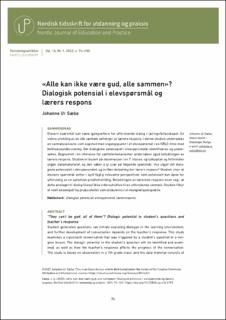| dc.contributor.author | Sæbø, Johanne Ur | |
| dc.date.accessioned | 2022-06-20T09:25:28Z | |
| dc.date.available | 2022-06-20T09:25:28Z | |
| dc.date.created | 2022-06-16T13:39:25Z | |
| dc.date.issued | 2022 | |
| dc.identifier.citation | Sæbø, J. U. (2022). «Alle kan ikke være gud, alle sammen»? Dialogisk potensial i elevspørsmål og lærers respons. Nordisk tidsskrift for utdanning og praksis, 16(1). | en_US |
| dc.identifier.issn | 2535-7697 | |
| dc.identifier.uri | https://hdl.handle.net/11250/2999513 | |
| dc.description.abstract | Elevers spørsmål kan være igangsettere for utforskende dialog i læringsfellesskapet. En videre utvikling av en slik samtale avhenger av lærers respons. I denne studien undersøkes en samtalesekvens som oppstod med utgangspunkt i et elevspørsmål i en KRLE-time med helklasseundervisning. Det dialogiske potensialet i elevspørsmålet identifiseres og undersøkes. Begrunnet i en interesse for samtalemekanismer undersøkes også betydningen av lærers respons. Studien er basert på observasjon i en 7. klasse, og lydopptak og feltnotater utgjør datamaterialet, og den søker å gi svar på følgende spørsmål: Hva utgjør det dialogiske potensialet i elevspørsmålet, og hvilken betydning har lærers respons? Studien viser at elevens spørsmål setter i spill faglig relevante perspektiver som potensielt kan åpne for utforsking av en autentisk problemstilling. Betydningen av lærerens respons viser seg i at dette anslaget til dialog likevel ikke videreutvikles til en utforskende samtale. Studien tilbyr et reelt eksempel fra praksisfeltet som diskuteres i et mulighetsperspektiv. | en_US |
| dc.description.abstract | English title:“They can’t be god, all of them”? Dialogic potential in student’s questions and teacher’s response
Student generated questions can initiate exploring dialogue in the learning environment, and further development of conversation depends on the teacher’s response. This study examines a classroom conversation that was triggered by a student’s question in a religion lesson. The dialogic potential in the student’s question will be identified and examined, as well as how the teacher’s response affects the progress of the conversation. The study is based on observation in a 7th grade class, and the data material consists of sound recordings and field notes. The study seeks to answer the following questions: What does the dialogic potential in the student’s question consist of, and how does the teacher’s response affect the development of the conversation? The study indicates that students ask academically challenging questions, also in situations not necessarily intended for further exploration. There are reasons to be optimistic as to the dialogic potential of student questions; however, there is an unrealized potential for richer exploratory conversations as the outcome of these questions. The study offers a real-life example from the field of practice which will be discussed in a perspective of possibility. | en_US |
| dc.language.iso | nob | en_US |
| dc.publisher | Cappelen Damm Akademisk | en_US |
| dc.rights | Navngivelse 4.0 Internasjonal | * |
| dc.rights.uri | http://creativecommons.org/licenses/by/4.0/deed.no | * |
| dc.subject | utdanningsvitenskap | en_US |
| dc.subject | dialog | en_US |
| dc.subject | pedagogikk | en_US |
| dc.title | "Alle kan ikke være gud, alle sammen"? Dialogisk potensial i elevspørsmål og lærers respons. | en_US |
| dc.type | Peer reviewed | en_US |
| dc.type | Journal article | en_US |
| dc.description.version | publishedVersion | en_US |
| dc.rights.holder | © 2022 Johanne Ur Sæbø | en_US |
| dc.subject.nsi | VDP::Samfunnsvitenskap: 200::Pedagogiske fag: 280 | en_US |
| dc.source.volume | 16 | en_US |
| dc.source.journal | Nordisk tidsskrift for utdanning og praksis | en_US |
| dc.source.issue | 1 | en_US |
| dc.identifier.doi | https://doi.org/10.23865/up.v16.3193 | |
| dc.identifier.cristin | 2032491 | |
| cristin.ispublished | true | |
| cristin.fulltext | original | |
| cristin.qualitycode | 1 | |

